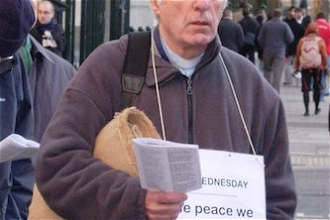Fr McDonagh reports from Cancun: 1. setting the stage

I arrived in Cancun, Mexico yesterday, and registered today, (27 November 2010) as a participant at the UN Climate Change Conference. This is the 16th meeting of Conference of the Parties (COP 16) to the UN Convention on Climate Change. As I write the organisers are still putting the final touches to the Conference Centre. Many representatives from NGOs are quite critical of the Conference logistics. A number of meeting rooms have only a curtain separating it from the next one so, if the loudspeakers are turned up, hearing what people say will be very difficult. In additions, the hotel at which the negotiations will take place is about 5 kilometres away from the main Centre. This is the first time, in my experience, that this has happened. Finally, the cost of everything, including food, is astronomical.
Still, it is important to mention a number of positive initiatives which the Mexican government has taken. With an estimated 15,000 people travelling to Cancun for the UN Climate Change Conference, the organizers are attempting to minimizing greenhouse gas emissions as far as possible and to offset whatever cannot be avoided. There are two parts to the strategy:
The first is directed at those who have travelled from all over the world to attend the conference. All delegates are encouraged to offset their international transport emissions. Delegates will be able to calculate their carbon footprint on-line at computer terminals at the conference. They are invited to make contributions to offset these emissions in a variety of energy-related projects in Mexico or elsewhere.
The second is aimed at minimising greenhouse gas emissions during the 12 days of the Conference in Cancun.
Much of the energy used during the UN Conference will come from renewable sources such as photovoltaic cells and wind generation. Delegations from the participating countries will be provided with hybrid vehicles for their transport during the Conference.
An eco-efficiency hotel programme is expected to avoid the consumption of approximately 200,000 cubic metres of water and the release of 4,000 tons of carbon dioxide into the atmosphere.
Finally, around 10,000 trees and bushes will be planted here in Cancun.
Those are a few of the positive initiatives here at the Cancun Climate Change Conference which is trying to pick up the pieces after the dismal failure to produce a fair, ambitious and legally binding treaty to curb greenhouse gases emissions at Copenhagen in December 2009
On the eve of the Cancun Conference, it is clear that the pledges which were made by 80 countries to reduce greenhouse gases have fallen well below what is needed to stabilise the world’s climate at below an increase of 2 degrees Celsius. Research by a top group of climate scientists has shown that, even if countries honoured their commitments, there would still be a 5 billion tonne gap each year. If, however, only weak measures are taken this will mean the emission gap could be as high as 12 billion tonnes annually by 2020.
Yvo de Boer, the Dutch civil servant, who guided the UN Climate Change Conference for the past four years, resigned in the summer of 2010 to work with private companies on climate change initiatives. In the week before the Cancun meeting he said that, “Although many nations pay lip service to (reducing greenhouse gases), most of them, deep in their hearts, are unsure. In fact, many developing nations fear that the intent of the West is to use climate as an excuse to keep them poor and maintain the current status quo.” Such distrust does not augur well for a positive outcome to the negotiations.
All eyes will be on the negotiating posture of both the United State and China at Cancun. Unless they are willing to compromise, little will be achieved. Unfortunately, the omens are not very favourable. The Obama administration was not able to get a climate change bill through the Senate earlier this year. Now, with the US House of Representative controlled by Republicans and the Democrats majority in the Senate seriously reduced, it is difficult to see any real progress on the Energy Bill. Until now the Chinese government has said that it wants to see major cuts in greenhouse gas emission from the US and other industrialised nations, before it will make pledges to reduce its emissions.


















